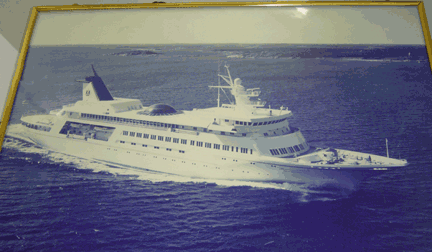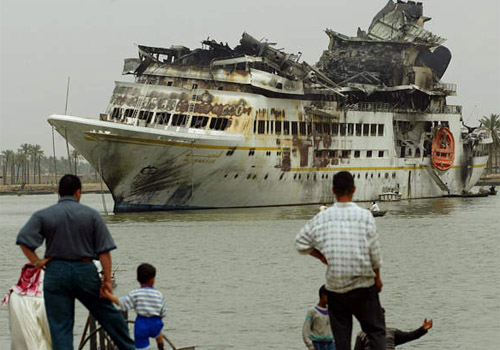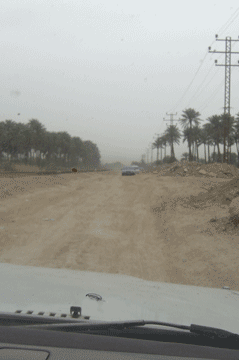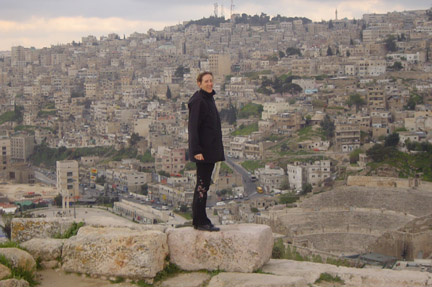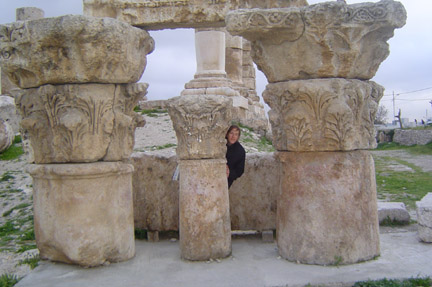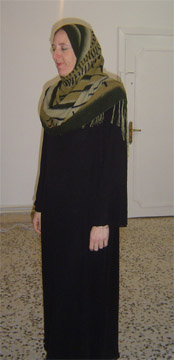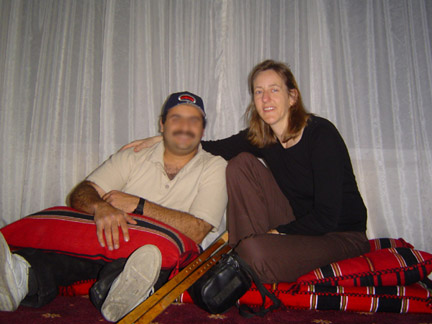The following is an exchange I had over Yahoo messenger with an Iraqi friend (named J) working for a U.S. contractor in Iraq.speacework: Yo sugar plum! You busy?
J: Hi, how are you?
speacework: I've got a big crick in my neck! Ouch!
J: Why?
speacework: slept on it funny
J.: oh
speacework: how are things in Baghdad?
J.: Baghdad is unpredictable
speacework: so how are things in your company?
J.: well, it is too bad here
speacework: hmmmm?
J.: military, guns
speacework: oh yeah, yucko ... are people at least nice to you in there ... or are they all jerks?
J.: well, the nice people left
speacework: oh shit.
J.: and I have to deal with bad ones now until my friends return back. people here rotate
speacework: in what way are they bad ... arrogant, mean, stupid?
speacework: all of the above?
J.: yes
J.: the worst is that they are Americans!
speacework: well, honey ... I'm not surprised ... Americans are really good about being arrogant, mean and stupid ... you just saw a few of the exceptions first.
J.: yes. you are an exception in your nation
speacework: I'm glad I'm an exception! There seem to be many a.m.s. people in Iraq these days and a good portion of them are Americans.
J.: ams??????????????
speacework: arrogant, mean & stupid ... a.m.s.
J.: ohhhhhhhh
J.: well, I have met good Americans here too but honestly, the bad ones are more then the good ones. The only thing that I have here is that they need me. That’s it. If they might not be in need of me, I will be out the next day
speacework: just curious but what is it, do you think, that makes them such jerks?
J.: I did not understand you.
speacework: well, people are usually jerks for a reason ... (I'm an optimist and think that most people start out nice and then something happens to them) ... I'm asking you why you think these people are such jerks? I mean, are they afraid of you because you are Iraqi and they think all Iraqis are dangerous or something?
J.: because they have had no experience and hard time in their life
J.: they children
speacework: whaddaya mean, "hard time" ... like they look poor and uneducated?
J.: The Americans in general are pation less
speacework: pation less ??? what is that?
J.: they have had no hard time in their life
J.: they act like children
J.: no paiciance
speacework: patience?
J.: yes
speacework: patience for the work you mean? patience with you?
J.: they need simply to grow up
J.: with every thing
J.: they are the most weak people I have ever seen
speacework: yeah, they probably want everything easy and everything now ... just like children.
J.: they can not tolerate anything
speacework: such as?
J.: any work obsticles
J.: time wasted
J.: in iraq you have to wait and waste your time for getting the simplest things. you know that.
speacework: yeah, I understand that ... but it did take me awhile to figure it out.
J.: They have turned Iraq into a cage and now they can not live in it
J.: everything here is collapsing
J.: electricity
J.: water
J.: communication
J.: streets
J.: all crap
speacework: And then these new guys rotate in and they just don't get it and make matters worse?
J.: besides, the people I work with they are lazy, not hard workers by any means
speacework: I suppose it's just a job and a good paycheck for them ... a very good paycheck ... since they probably get hazard pay for working in Iraq
J.: yes, even some of the old ones. You can find 1 reasonable person among 50 here, 1 who cares about the others. 100 do not care, only about themselves
speacework: Is what you are experiencing typical ... normal for all the folks in the Green Zone and bases and working with the contractors?
J.: almost
speacework: It's a tragedy, really ... because they are only making the situation worse.
J.: I start to think that only US losers come to work here and that is why it is screwed here
speacework: You might be right! ... speaking as a loser myself! I mean, if you have a good life in the states, why would you come to a place like Iraq? Only losers and do-gooders come ... hopefully, I'm a do-gooder not a loser.
J.: you are bored from your quite community. that is why you are here
speacework: I suppose that's true too. I was bored with my life in the U.S. and didn't feel I was accomplishing anything.
J.: your reaction is healthy. It better than get spoiled by the prosperity
speacework: In my case, I've always wanted to try to do things that were useful. I mean, I could make a lot of money in Iraq if I signed up to work for some of these contractors ... but instead I'm working for less money than you get because I’m working for an Iraqi environmental group! Some people would say that I should have my head examined!
speacework: My boss just found out how old I am (42 if you recall)... he was shocked ... thought I was much younger. I guess he thought, "Why would a person still be working for peanuts at her age." But when you work for non-profits, it's almost like you take a vow of poverty.
J.: yes, but I think you have your home back at US? I mean you are not homeless, poor.
speacework: no, I don't have a home in the U.S. I have a storage locker!
J.: work for profit then
speacework: Yeah, but then I would have to work with the jerks you work with who don't accomplish anything. I'd rather be poor and do good work, than make money and do shitty work. But I know that even folks who work for profit can do good work ... I'm not saying it can't happen ... it's just harder.
J.: well yes but normally Americans are all ego, they don’t have a team work
speacework: huh?
J.: ego = care about themselves, can not see others even, some times here i think myself invisible!
speacework: yeah ... I wonder what it would take for them to see you?
speacework: Hey J., are there alot of folks like you working for contractors ... or are people like you pretty rare?
J.: well, I have seen a lot of Iraqis turned into an assholes here. They have sure made more progress than I have
speacework: what do you mean ... more progress?
J.: turning into an ass holes - turning into americans
speacework: more progress at turning into ams people? Well, I hope you never turn into one of THOSE people!
J.: I not making enough progress on that regard
speacework: That is good!!!
J.: I like my self Iraqi
J.: but Americans dont like iraqis
J.: I met iraqies changed their name into an American here!
speacework: Oh my God! You are kidding me right? What name did they pick???
J.: Bye. I have to go.
speacework: Oh, not fair!
speacework: Not fair! You have to tell me!
speacework: Shit!
